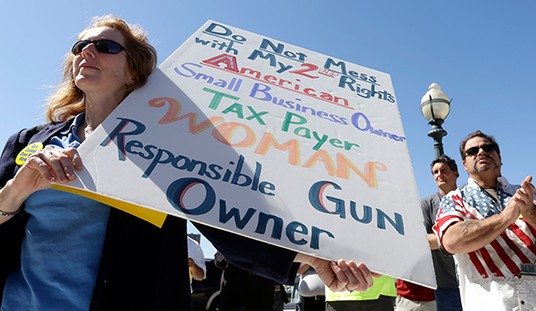Anti-gun banks and woke corporations seeking to impose their own restrictions on companies within the firearms industry are now facing pushback from the industry itself in the form of the FIND Act; legislation that blocks companies that discriminate against the firearms industry from doing business with state governments. On today’s Bearing Arms’ Cam & Co, the National Shooting Sports Foundation’s director of government relations Darren LaSorte joined me to explain how the bill works and where it could be soon enshrined into law.
The Firearm Industry Nondiscrimination Act has been floating around state legislatures for a little more than a year now, with Texas Gov. Greg Abbott signing the measure into law last June. The new law, which had an immediate impact on the municipal bond market in the state, bars companies that discriminate against the firearms industry from entering into any contract with a state agency or a political subdivision worth more than $100,000 (with a few limited exceptions). The result, according to none other than Michael Bloomberg’s pet news network, can be felt in a number of ways.
Banks that distribute benefits, hold state or municipal bank accounts or even take advantage of state tax credits in underwriting economic development activity also must certify their compliance with the law, said Peter Dugas, executive director of risk, regulatory and compliance services at CAPCO, a consulting firm to banks.
“There are a lot of activities that financial institutions engage in,” that will be subject to the new law, Dugas said. He said bank have been scouring their contracts with state entities to see if they need to add certifications for the new gun law.
Since Abbott signed the bill last year, a number of other states have started debating the FIND Act as well, and LaSorte feels good about the chances of the bill becoming law in Oklahoma, Missouri, Kansas, and Arkansas either this year or next, but the measure could face some tough hurdles in several states as well. Louisiana lawmakers, for instance, approved the FIND Act last year, only to see it vetoed (along with Constitutional Carry) by Democratic governor John Bel Edwards. LaSorte says he’s hopeful that the votes will be there in Baton Rouge to override another veto by Edwards if necessary this year, while in Arizona, the FIND Act has passed the House, but is still a couple of votes shy of a majority in the Senate.
In a previous story about the FIND Act’s progress in the Oklahoma legislature, I said the bill may be a bit of a political stunt because financial institutions can always claim that they’re not discriminating against the firearms industry but simply choosing not to business with certain companies within the gun industry because they don’t comply with the anti-gun policies in place at financial giants like Citigroup or JPMorgan. While LaSorte acknowledged that at least one bank (Citigroup) is indeed trying to make that argument in order to keep up business as usual in the state of Texas, he also argued that the gun control policies Citigroup wants Texas firearms-related businesses to comply with end up effecting virtually all of them.
No gun store in the Lone Star State, for example, is going to willingly choose not to lawfully sell long guns to 18-, 19-, and 20-year olds, or to voluntarily cap the size of the magazines they sell to 10 rounds, which means that a woke corporation intent on applying their mandates as stringently as possible will be able to block all gun stores in the state from doing business with them even though they’re entirely law-abiding entities.
It’s an argument that won over Lone Star State lawmakers, but you better believe the big banks and other woke corporations who are vying for that sweet, sweet, taxpayer money are lobbying hard against the FIND Act wherever it’s up for debate. You can find out LaSorte’s response to the common arguments he hears from opponents of the FIND Act in the interview above, and I look forward to keeping the conversation with him going as the legislation continues to take root across the country in the months ahead.










Join the conversation as a VIP Member